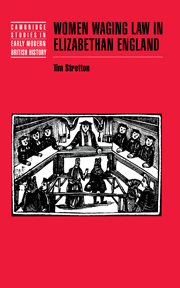Book contents
- Frontmatter
- Contents
- Lists of maps and figures
- List of tables
- Preface
- Notes on the text
- Abbreviations
- 1 Introduction
- 2 Women, legal rights and law courts
- 3 Female litigants and the culture of litigation
- 4 The Court of Requests
- 5 Unmarried women and widows
- 6 Married women in Requests
- 7 Freebench, custom and equity
- 8 Pleading strategies in Requests
- 9 Women waging law
- Glossary
- Bibliography
- Index
- Cambridge Studies in Early Modern British History
7 - Freebench, custom and equity
Published online by Cambridge University Press: 11 November 2009
- Frontmatter
- Contents
- Lists of maps and figures
- List of tables
- Preface
- Notes on the text
- Abbreviations
- 1 Introduction
- 2 Women, legal rights and law courts
- 3 Female litigants and the culture of litigation
- 4 The Court of Requests
- 5 Unmarried women and widows
- 6 Married women in Requests
- 7 Freebench, custom and equity
- 8 Pleading strategies in Requests
- 9 Women waging law
- Glossary
- Bibliography
- Index
- Cambridge Studies in Early Modern British History
Summary
We still understand only imperfectly the tenacity and force of local custom
E.P. Thompson, ‘The grid of inheritance’ (1976)Scrutiny of the records of the Court of Requests has so far shed light on women's relationship with equity, with the common law and, if we include the scattering of separation and maintenance cases, with ecclesiastical law. It has become apparent that women suffered the ill effects of discriminatory rules in all of these systems, but that canny individuals who were aware of their rights, and who had access to the jurisdictions that best suited their needs, could and did use the law to advantage. Now it is the turn of custom. The Masters heard a considerable number of customary actions, brought by litigants from manors all over England. These plaintiffs used Requests as a court of appeal, arguing that they could not receive a fair hearing in their manor court, due to the power and influence of their opponents or the bias of the steward, the lord or the lady of the manor. And, as we shall see, many of these litigants were women. Lacking knowledge of every local custom, the Masters usually appointed commissioners to decide matters on their behalf, or else to equip them with the means to settle these deeply local conflicts from within the White Hall in London. The surviving interrogatories, depositions, copies of documents and commission reports, along with case materials and the written decisions and orders of the court, provide a unique source for investigating customary disputes.
- Type
- Chapter
- Information
- Women Waging Law in Elizabethan England , pp. 155 - 177Publisher: Cambridge University PressPrint publication year: 1998



